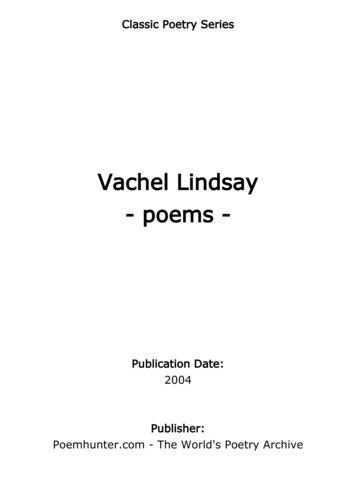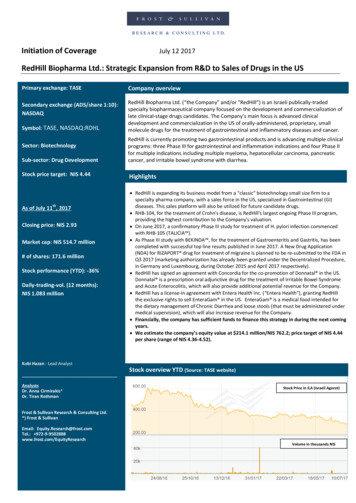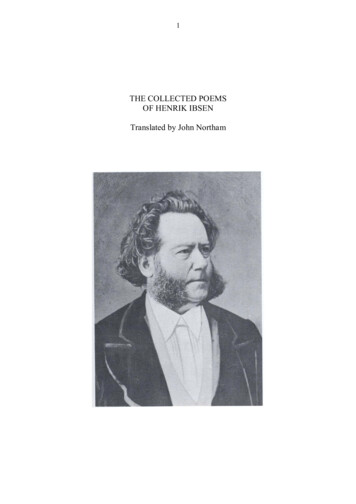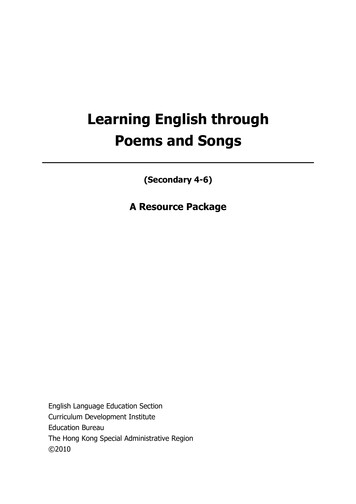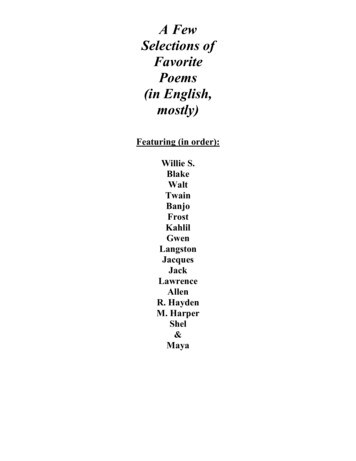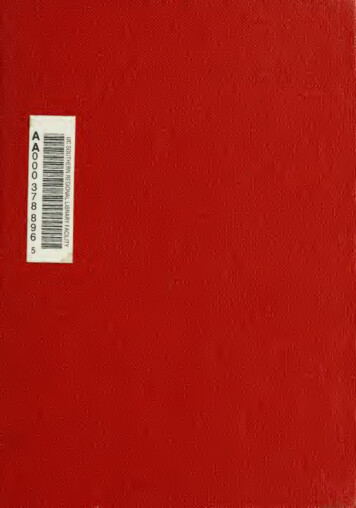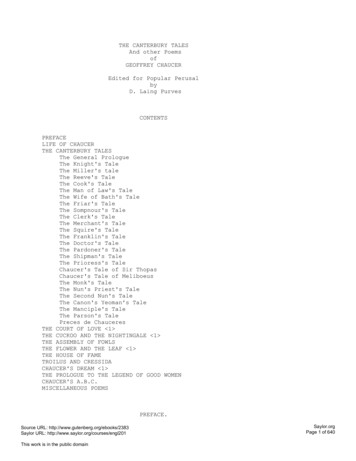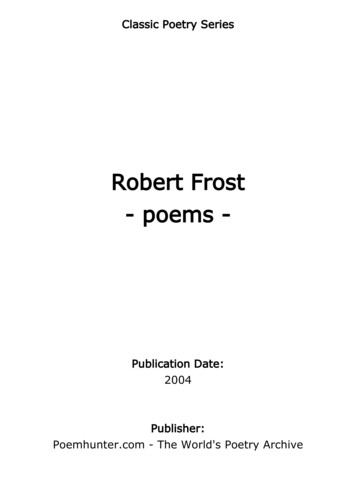
Transcription
Classic Poetry SeriesRobert Frost- poems -Publication Date:2004Publisher:Poemhunter.com - The World's Poetry Archive
Robert Frost(March 26, 1874 – January 29, 1963)Robert Lee Frost was an American poet. He is highly regarded for his realisticdepictions of rural life and his command of American colloquial speech. His workfrequently employed settings from rural life in New England in the early twentiethcentury, using them to examine complex social and philosophical themes. Apopular and often-quoted poet, Frost was honored frequently during his lifetime,receiving four Pulitzer Prizes for Poetry.Early yearsRobert Frost was born in San Francisco, California, to journalist William PrescottFrost, Jr., and Isabelle Moodie. His mother was of Scottish descent, and hisfather descended from Nicholas Frost of Tiverton, Devon, England, who hadsailed to New Hampshire in 1634 on the Wolfrana.Frost's father was a teacher and later an editor of the San Francisco EveningBulletin (which afterwards merged into the San Francisco Examiner), and anunsuccessful candidate for city tax collector. After his father's death in May 5,1885, in due time the family moved across the country to Lawrence,Massachusetts under the patronage of (Robert's grandfather) William Frost, Sr.,who was an overseer at a New England mill. Frost graduated from Lawrence HighSchool in 1892. Frost's mother joined the Swedenborgian church and had himbaptized in it, but he left it as an adult.Despite his later association with rural life, Frost grew up in the city, andpublished his first poem in his high school's magazine. He attended DartmouthCollege long enough to be accepted into the Theta Delta Chi fraternity. Frostreturned home to teach and to work at various jobs including deliveringnewspapers and factory labor. He did not enjoy these jobs at all, feeling his truecalling as a poet.Adult yearsIn 1894 he sold his first poem, "My Butterfly: An Elegy" (published in theNovember 8, 1894 edition of the New York Independent) for fifteen dollars.Proud of this accomplishment he proposed marriage to Elinor Miriam White, butshe demurred, wanting to finish college (at St. Lawrence University) before theymarried. Frost then went on an excursion to the Great Dismal Swamp in Virginia,and asked Elinor again upon his return. Having graduated she agreed, and theywere married at Harvard University[citation needed], where he attended liberalwww.PoemHunter.com - The World's Poetry Archive1
arts studies for two years.He did well at Harvard, but left to support his growing family. Grandfather Frosthad, shortly before his death, purchased a farm for the young couple in Derry,New Hampshire; and Robert worked the farm for nine years, while writing earlyin the mornings and producing many of the poems that would later becomefamous. Ultimately his farming proved unsuccessful and he returned to educationas an English teacher, at Pinkerton Academy from 1906 to 1911, then at the NewHampshire Normal School (now Plymouth State University) in Plymouth, NewHampshire.In 1912 Frost sailed with his family to Great Britain, living first in Glasgow beforesettling in Beaconsfield outside London. His first book of poetry, A Boy's Will, waspublished the next year. In England he made some important acquaintances,including Edward Thomas (a member of the group known as the Dymock Poets),T.E. Hulme, and Ezra Pound. Pound would become the first American to write a(favorable) review of Frost's work. Surrounded by his peers, Frost wrote some ofhis best work while in England.As World War I began, Frost returned to America in 1915. He bought a farm inFranconia, New Hampshire, where he launched a career of writing, teaching, andlecturing. This family homestead served as the Frosts' summer home until 1938,and is maintained today as 'The Frost Place', a museum and poetry conferencesite at Franconia. During the years 1916–20, 1923–24, and 1927–1938, Frosttaught English at Amherst College, Massachusetts, notably encouraging hisstudents to account for the sounds of the human voice in their writing.For forty-two years, from 1921 to 1963, Frost spent almost every summer andfall teaching at the Bread Loaf School of English of Middlebury College, at themountain campus at Ripton, Vermont. He is credited as a major influence uponthe development of the school and its writing programs; the Bread Loaf Writers'Conference gained renown during Frost's tenure there.[citation needed] Thecollege now owns and maintains his former Ripton farmstead as a nationalhistoric site near the Bread Loaf campus. In 1921 Frost accepted a fellowshipteaching post at the University of Michigan, Ann Arbor, where he resided until1927; while there he was awarded a lifetime appointment at the University as aFellow in Letters. The Robert Frost Ann Arbor home is now situated at The HenryFord Museum in Dearborn, Michigan. Frost returned to Amherst in 1927. In 1940he bought a 5-acre (2.0 ha) plot in South Miami, Florida, naming it Pencil Pines;he spent his winters there for the rest of his life.Harvard's 1965 alumni directory indicates Frost received an honorary degreewww.PoemHunter.com - The World's Poetry Archive2
there. He also received honorary degrees from Bates College and from Oxfordand Cambridge universities; and he was the first person to receive two honorarydegrees from Dartmouth College. During his lifetime the Robert Frost MiddleSchool in Fairfax, Virginia, and the main library of Amherst College were namedafter him.Frost was 86 when he spoke and performed a reading of his poetry at theinauguration of President John F. Kennedy on January 20, 1961. Some two yearslater, on January 29, 1963, he died, in Boston, of complications from prostatesurgery. He was buried at the Old Bennington Cemetery in Bennington, Vermont.His epitaph reads, "I had a lover's quarrel with the world."Frost's poems are critiqued in the "Anthology of Modern American Poetry",Oxford University Press, where it is mentioned that behind a sometimescharmingly familiar and rural façade, Frost's poetry frequently presentspessimistic and menacing undertones which often are not recognized noranalyzed.One of the original collections of Frost materials, to which he himself contributed,is found in the Special Collections department of the Jones Library in Amherst,Massachusetts. The collection consists of approximately twelve thousand items,including original manuscript poems and letters, correspondence, andphotographs, as well as audio and visual recordingswww.PoemHunter.com - The World's Poetry Archive3
"In White": Frost's Early Version Of DesignA dented spider like a snow drop whiteOn a white Heal-all, holding up a mothLike a white piece of lifeless satin cloth Saw ever curious eye so strange a sight? Portent in little, assorted death and blightLike the ingredients of a witches' broth? The beady spider, the flower like a froth,And the moth carried like a paper kite.What had that flower to do with being white,The blue prunella every child's delight.What brought the kindred spider to that height?(Make we no thesis of the miller's plight.)What but design of darkness and of night?Design, design! Do I use the word aright?Anonymous submission.Robert Frostwww.PoemHunter.com - The World's Poetry Archive4
A Boundless MomentHe halted in the wind, and - what was thatFar in the maples, pale, but not a ghost?He stood there bringing March against his thought,And yet too ready to believe the most.'Oh, that's the Paradise-in-bloom,' I said;And truly it was fair enough for flowershad we but in us to assume in marchSuch white luxuriance of May for ours.We stood a moment so in a strange world,Myself as one his own pretense deceives;And then I said the truth (and we moved on) .A young beech clinging to its last year's leaves.Robert Frostwww.PoemHunter.com - The World's Poetry Archive5
A Brook In The CityThe farmhouse lingers, though averse to squareWith the new city street it has to wearA number in. But what about the brookThat held the house as in an elbow-crook?I ask as one who knew the brook, its strengthAnd impulse, having dipped a finger lengthAnd made it leap my knuckle, having tossedA flower to try its currents where they crossed.The meadow grass could be cemented downFrom growing under pavements of a town;The apple trees be sent to hearth-stone flame.Is water wood to serve a brook the same?How else dispose of an immortal forceNo longer needed? Staunch it at its sourceWith cinder loads dumped down? The brook was thrownDeep in a sewer dungeon under stoneIn fetid darkness still to live and run -And all for nothing it had ever doneExcept forget to go in fear perhaps.No one would know except for ancient mapsThat such a brook ran water. But I wonderIf from its being kept forever under,The thoughts may not have risen that so keepThis new-built city from both work and sleep.Robert Frostwww.PoemHunter.com - The World's Poetry Archive6
A Cliff DwellingThere sandy seems the golden skyAnd golden seems the sandy plain.No habitation meets the eyeUnless in the horizon rim,Some halfway up the limestone wall,That spot of black is not a stainOr shadow, but a cavern hole,Where someone used to climb and crawlTo rest from his besetting fears.I see the callus on his soulThe disappearing last of himAnd of his race starvation slim,Oh years ago - ten thousand years.Robert Frostwww.PoemHunter.com - The World's Poetry Archive7
A Considerable Speck(Microscopic)A speck that would have been beneath my sightOn any but a paper sheet so whiteSet off across what I had written there.And I had idly poised my pen in airTo stop it with a period of inkWhen something strange about it made me think,This was no dust speck by my breathing blown,But unmistakably a living miteWith inclinations it could call its own.It paused as with suspicion of my pen,And then came racing wildly on againTo where my manuscript was not yet dry;Then paused again and either drank or smelt-With loathing, for again it turned to fly.Plainly with an intelligence I dealt.It seemed too tiny to have room for feet,Yet must have had a set of them completeTo express how much it didn't want to die.It ran with terror and with cunning crept.It faltered: I could see it hesitate;Then in the middle of the open sheetCower down in desperation to acceptWhatever I accorded it of fate.I have none of the tenderer-than-thouCollectivistic regimenting loveWith which the modern world is being swept.But this poor microscopic item now!Since it was nothing I knew evil ofI let it lie there till I hope it slept.I have a mind myself and recognizeMind when I meet with it in any guiseNo one can know how glad I am to findOn any sheet the least display of mind.Robert Frostwww.PoemHunter.com - The World's Poetry Archive8
A Dream PangI had withdrawn in forest, and my songWas swallowed up in leaves that blew alway;And to the forest edge you came one day(This was my dream) and looked and pondered long,But did not enter, though the wish was strong:You shook your pensive head as who should say,‘I dare not—too far in his footsteps stray—He must seek me would he undo the wrong.Not far, but near, I stood and saw it allBehind low boughs the trees let down outside;And the sweet pang it cost me not to callAnd tell you that I saw does still abide.But ’tis not true that thus I dwelt aloof,For the wood wakes, and you are here for proof.Robert Frostwww.PoemHunter.com - The World's Poetry Archive9
A Fountain, a Bottle, a Donkey's Ears, and SomeBooksOld Davis owned a solid mica mountainIn Dalton that would someday make his fortune.There'd been some Boston people out to see it:And experts said that deep down in the mountainThe mica sheets were big as plate-glass windows.He'd like to take me there and show it to me.'I'll tell you what you show me. You rememberYou said you knew the place where once, on Kinsman,The early Mormons made a settlementAnd built a stone baptismal font outdoorsBut Smith, or someone, called them off the mountainTo go West to a worse fight with the desert.You said you'd seen the stone baptismal font.Well, take me there.'Someday I will.''Today.''Huh, that old bathtub, what is that to see?Let's talk about it.''Let's go see the place.''To shut you up I'll tell you what I'll do:I'll find that fountain if it takes all summer,And both of our united strengths, to do it.''You've lost it, then?''Not so but I can find it.No doubt it's grown up some to woods around it.The mountain may have shifted since I saw itIn eighty-five.''As long ago as that?'www.PoemHunter.com - The World's Poetry Archive10
'If I remember rightly, it had sprungA leak and emptied then. And forty yearsCan do a good deal to bad masonry.You won't see any Mormon swimming in it.But you have said it, and we're off to find it.Old as I am, I'm going to let myselfBe dragged by you all over everywhere- ''I thought you were a guide.''I am a guide,And that's why I can't decently refuse you.'We made a day of it out of the world,Ascending to descend to reascend.The old man seriously took his bearings,And spoke his doubts in every open place.We came out on a look-off where we facedA cliff, and on the cliff a bottle painted,Or stained by vegetation from above,A likeness to surprise the thrilly tourist.'Well, if I haven't brought you to the fountain,At least I've brought you to the famous Bottle.''I won't accept the substitute. It's empty.''So's everything.''I want my fountain.''I guess you'd find the fountain just as empty.And anyway this tells me where I am.''Hadn't you long suspected where you were?''You mean miles from that Mormon settlement?Look here, you treat your guide with due respectIf you don't want to spend the night outdoors.I vow we must be near the place from whereThe two converging slides, the avalanches,www.PoemHunter.com - The World's Poetry Archive11
On Marshall, look like donkey's ears.We may as well see that and save the day.''Don't donkey's ears suggest we shake our own?''For God's sake, aren
As World War I began, Frost returned to America in 1915. He bought a farm in Franconia, New Hampshire, where he launched a career of writing, teaching, and lecturing. This family homestead served as the Frosts' summer home until 1938, and is maintained today as 'The Frost Place', a museum and poetry conference site at Franconia. During the years 1916–20, 1923–24, and 1927–1938, Frost .

